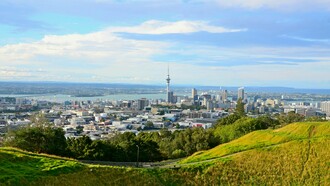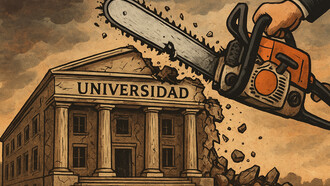Yasmin Corrales 38 year old, Head of the African Youth International Relations Commission of the United Socialist Party of Venezuela, she talks to us from the heart.
The loss of her father at the age of 10 was the first trigger of her maturity, marked her forever, shaped her personality and gave birth to her rage to live.
Born in one of the barrios of Caracas, to a nurse mother and a public accountant father, who died at an early age due to the malpractices and carelessness of a failing health system, Yasmin's only quest was to challenge this precarious fate in a neighborhood plagued by drugs, violence and desolation, constantly questioning herself: Why does she live in such a precarious social environment? Why was there no water or gas like everywhere else? Why did her mother have to work harder to support them? Why was there so much violence? Why are girls raped? And why are they not protected and cared for, including her sister? Why is there such a deterioration of human values? A social crisis, no running water in the houses, violence around the high school she attended, young people immersed in drugs, girls just out of puberty already pregnant, no health care, no social security coverage for the poor and the working class, a hospital system plagued by strikes and unable to care for patients like her father who died, while the community was just asking for hope, the need for change, for transformation.
My mother Jafet Belinda Gonzalez, who was my main inspiration when the world only showed me adversity.
All these reasons led her to stand up against a reality she did not want and a system that needed to be changed. Nourished by her determination to fight for her family and her community, she was among the young people who accompanied the revolutionary movements to liberate Venezuela, but before that she had to train, continue her studies and make sacrifices to do so following an educational project offered to the 17-18 years old who could not enter university. She accompanied her student life with her political commitment to the Student Movement (Movimiento Estudiantil Encuentro Critico), and later as a member of the youth of the United Socialist Party of Venezuela, which was strongly committed to exchanges with young people on the African continent.
It was thanks to her mother, a bastion of struggle alone, that she was able to build and inspire herself, to succeed in her studies and enter an elite training, for an elite profession, and to the revolutionary process where she found herself on an equal footing with others to succeed, and to obtain a master's degree in Latin American studies and an investigation into the struggles of African women, and then by dint of hard work and willpower that she became a diplomat.
When my country was torn apart by the revolution, a new constitution was passed and a series of rights were put in place. We finally realised that we had rights. Chavez used to say it's not about having laws, it's about owning those laws.
A socialist society is inconceivable without the full participation of women on an equal footing with men.
The revolution is above all feminist, because women are the pillar of the revolution.
(Chavez)
Previously, Venezuela was just synonymous with plastically beautiful women, but thanks to Chavez, who capitalized on the impact of the word woman, including the notion of gender, as a woman and a citizen, women were able to revive the origins of the Bolivarian revolution, its references, and the importance of its identity and multiculturalism in building the history of the country. If they are not heads of their families, they are heads of their communities, heads of the workplace, heads of parties, heads of social movements, musicians, orchestra leaders, they have reclaimed their rights and are exercising their role, even if they do not yet have sufficient political representation, they continue the struggle.
Yasmin is a mixture of indigenous and African origins and the question of identity is of primary importance to her: "We have valiant women of Caribbean and African blood who have played a leading role throughout the centuries, such as Teresa Carreño, a great pianist of the 17th century, who composed a work of a patriotic nature, Himno a Bolívar. Others who have been pillars of our society, such as Lucena Tibisay, rector of the National Experimental Arts University (Unearte), then president of the National Electoral Council and current Minister of Education, Argélia Alaya, politician, Maria Leon, one of the living references of the Venezuelan feminist struggle, activist of international solidarity for just causes such as the Palestinian, Sahrawi, Cuban, Nicaraguan and other causes. Reina Arratia, feminist, social worker, fighter for social inclusion and racism. Yulimar Rojas a sports heroine, who broke her own world record in the women's triple jump in 2020 in Tokyo. Zobeyda Jimenez a figure of art and ancestral cultural know-how, with her world-famous rag dolls, "Ciudad Cancion", "Cities in Song", a popular music project, to highlight traditional musical instruments and bring talented children, youth and adult musicians out of the shadows at national and international level.
It is a people who, despite the economic embargo imposed by the United States, have succeeded in breaking away from the classical cultural pattern of the past by creating the largest symphony orchestra in the world, registered in the Guinness Book of Records, with 8573 local musicians of Afro-Venezuelan culture who have finally been recognised for their talent, and who have masterfully performed Tchaikovsky's Slavic March, a 12-minute long work.
From slavery to cultural recognition
With 53% Afro-descendants, we can proudly recognise our Afro-Venezuelan culture with eight states throughout the country that contain the history and memory of those who fought against racial discrimination and who, after a long struggle, succeeded in gaining their freedom, Thanks to their participation in the revolution, at the academic, investigative and field levels, and to the implementation of various projects by Chavez to promote their participation in the political, economic, social and cultural life of the nation, they are now recognised and considered.
Her career in Africa: the place of women in Africa
Regardless of the difficulties of misunderstanding languages in Africa, she has built up a network of contacts and relationships with women and young people in Africa around the fight against imperialism, and for the construction of an authentic project of South-South convergence, generating opportunities for young people from both continents in the midst of an explosion of cultural and artistic productivity.
Her first professional position was in Benin, in the framework of exchanges with women who have implemented the participatory, social and solidarity economy to manage their community, build their houses, provide for their needs and free themselves from the repression of society. Then in Ghana, with the strong militancy of women in the pan-African movement against the colonial system. In Angola and South Africa, where women are responsible for international relations, and the African women's movement is very active. Always evolving, they are all fighting against the underhanded colonial system of wealth exploitation by foreign mega-projects and corporations.
Dismantling the patriarchal system
Quoting Argelia Laya: "A socialist society is inconceivable without the full participation of women on an equal footing with men”.
I exist in society and I recognise myself in my main role as a protagonist with my duties and rights in the exercise of my profession.
It was in an elitist field such as studying international law and then the diplomatic corps, that Yasmin was able to see the pervasiveness of patriarchy, because even though there are many women there, they are not proportionally equal to men. If the ambassador is a man, the woman is always second. In the latest cabinet reshuffle, Nicolas Maduro has surrounded himself with women at the head of several ministries such as the Ministry of Women and Gender Equality, Fisheries, Indigenous Peoples, and Health, as well as representatives in the National Assembly. Thus, despite the turmoil of patriarchy, the master brains of the Bolivarian revolution underway today are women, and one of the most important projects led by them is the project of self-construction of their own houses, built brick by brick from the planning, the layout, the foundations to the structuring, the architecture.
What a better way to dismantle the patriarchal system than to tell the world that women, organized in an inclusive ambitious project, can help each other and build social housing with their own hands. A project that Venezuela is offering to the world.
Her links with Tunisia
Before coming here, I learned about the situation of women in Tunisia, the progress made, the struggles undertaken, the failures, the successes and the challenges they face today. To have voted the right to abortion in 1973, before France in 1975, is a remarkable advance for Tunisia, when in our country, abortion is still being discussed in the national assembly.
It is necessary to listen to new voices, in order to promote new methods that show a new vision and new ways of fighting. Women are active, thinking, fighting, they need to be made visible everywhere, in Mansoura, in Guebili, urgent measures and actions are needed to dismantle systems of oppression such as patriarchy associated with capitalism, and to highlight the different forms of cultural and artistic expression that exist to spread them throughout the regions in the interior of the country.
We have learned that in order to change a society, we need a lot of love, to love who we are, to love the country, to achieve our objectives in the construction of a society that includes young people and the different strata of society, in sharing and exchange.
"Diplomacy, impregnated with culture, pushes the diplomacy of peoples as a seed to open the way to the construction of other types of relations where art, culture and creativity are masters .....". as in the recent staging by Yasmin of a series of performances, in the capital and in the south of Tunisia, between the Herencia Group, made up of two artist-professors from the National Experimental Art University, Manuel Moreno and Monica Mancera, through their new project "Mujer Tambor", and the professors and students of the Institut Supérieur de Musique de Tunis in master classes of Jam session percussion and stambali traditional Afro-Tunisian music, Banga and Afro-Venezuelan percussion and workshops of traditional music under the direction of Zouheir Gouja and his immense talent to marry cultures, percussions and music. Then in the south of Tunisia with the singing and dancing troupes of southern Tunisia. Rich and strong exchanges, links woven between Tunisia, its history, its culture, its art and its position in the African continent and the incredible artistic charm of the people of the Bolivarian Republic of Venezuela with all that its historical weight can awaken in the hearts and minds of those in love with this country... beyond the oil revenues that some and others covet.
And, despite the attacks and the blockade, we have the capacity to reinvent our struggles, to take up challenges and to continue to reinvent ourselves and find ways to counter the difficulties imposed on us, to circumvent them and to overcome them without ceasing.















